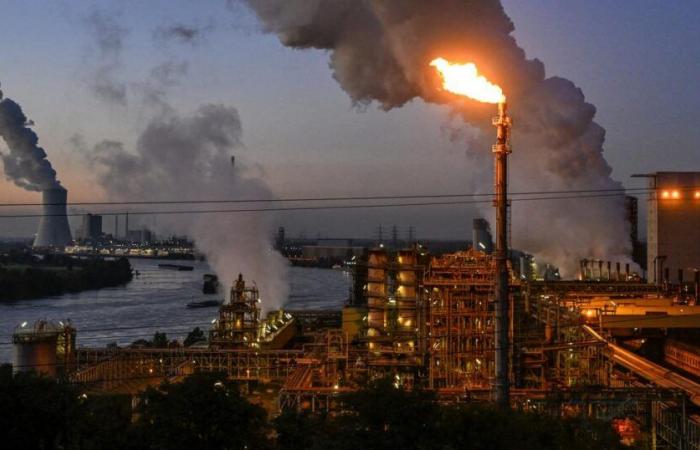After a very marked decline of around 10% in 2023, the German emissions reduction curve has «clearly inflected» last year with a drop limited to 3%, according to the Agora Energiewende expert group.
Greenhouse gas emissions from Germany, Europe’s leading industrial nation, continued to decline in 2024, but at a slower pace, due to a lack of sufficient investment by manufacturers and households in more climate-friendly technologies. After a very marked decline of around 10% in 2023, the German emissions reduction curve has “clearly inflected” last year with a drop limited to 3%, according to calculations by the Agora Energiewende expert group, a leading German organization.
At EU level, the expected drop is around 3.8%, after 8% in 2023 with 18 million tonnes of CO2 equivalent less, Germany is doing better than its 2024 target, enshrined in law national climate protection policy, explains the study. But the results of the transport and buildings sectors, weak links in the energy transition, remain insufficient.
The recession helps
The sharp decline in 2023 was notably attributable to a 12% drop in emissions from the powerful German industrial sector mired in the crisis. Agora Energiewende experts warned at the time that this decline was not linked to real structural changes in production methods. Proof with these new results: Germany should experience a slightly weaker recession in 2024 than in 2023 and this was enough to degrade the carbon footprint of the industrial sector.
In the event of a real economic recovery, particularly in the most energy-intensive sectors such as chemicals, steel or paper, CO2 emissions should soar again. “No structural progress has been seen in industry, buildings and transport. On the contrary, investments in climate-neutral technologies (…) even decreased compared to the previous year”notes the study.
Economic and political uncertainty in Germany creates a “feeling of insecurity among households and businesses”who are reluctant to invest. In the housing sector, the slight drop in emissions can only be attributed to mild weather conditions which reduced the use of heating. However, many indicators are green: emissions were 48% lower than the reference year 1990, approaching the objective set by the European Union of a 55% reduction by 2030.
Renewable record
Energy producers are the good students of the 2024 vintage: they alone are responsible for 80% of the total drop in greenhouse gas emissions thanks to the closure of coal-fired power plants and record production of renewable energies . Wind, solar, biomass, hydraulic energy: renewable sources have increased from 56% to 59% of total electricity production in one year, according to figures from the German energy regulator. The share of coal decreased from 26% to less than 23% in 2024, the first year in which nuclear power disappeared from the production mix of Europe’s largest economy.
This is the example to follow, believes Simon Müller, director of Agora Energiewende Deutschland: in the production of electricity, “climate protection measures taken in recent years are increasingly showing their effects”. With the legislative elections of February 23 in his sights, he calls on candidates for chancellor to “transferring the dynamics of transformation from the electricity sector to the sectors” where decarbonization is slipping.






